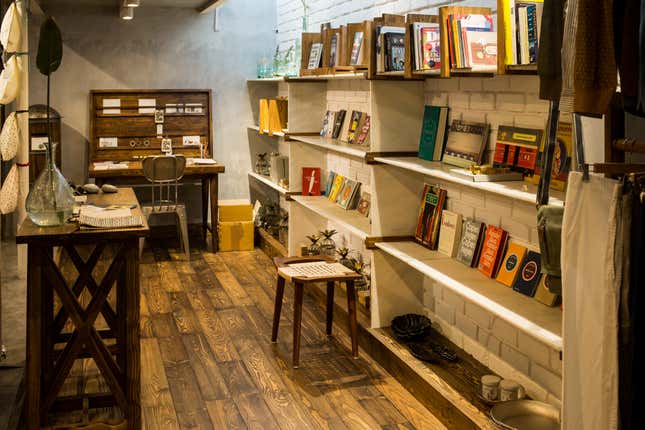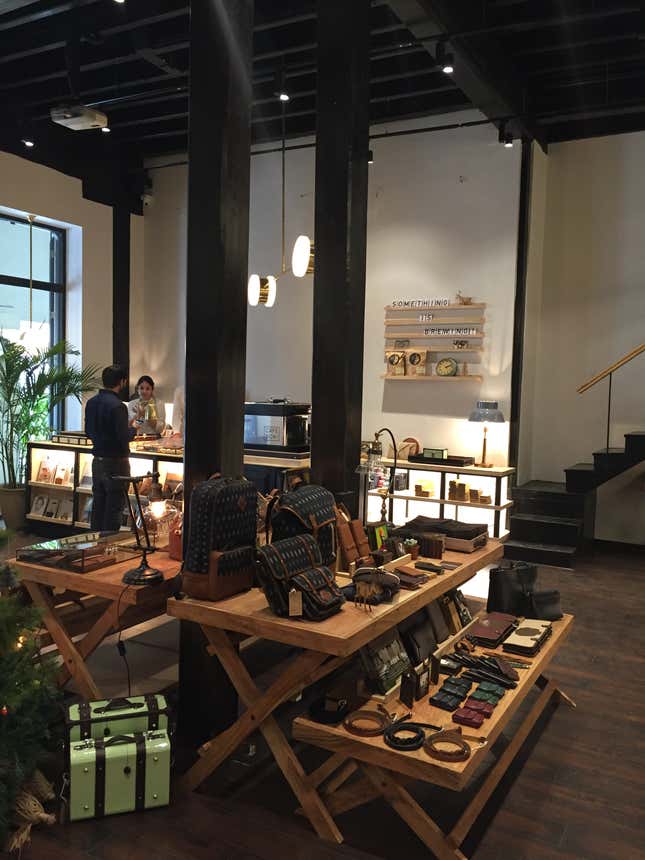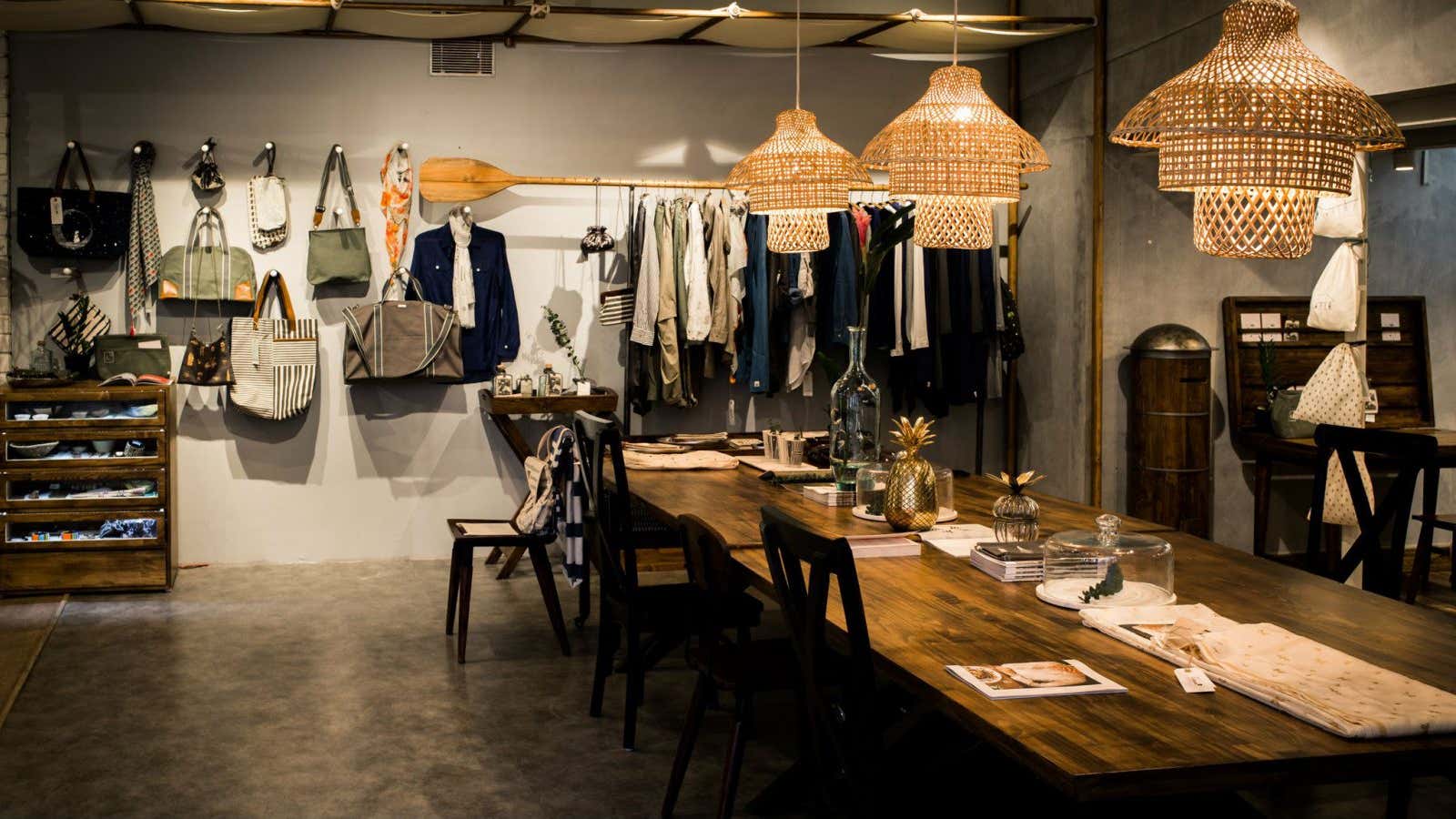With e-commerce websites offering everything from hair clips to wedding wear, along with easy delivery, local stores upgrading their designs, and foreign retailers such as H&M and Muji setting up shop in big cities, the urban Indian customer is spoilt for choice.
But all these options can be overwhelming. Finding just the right pair of pants or a specific style of shoe after going through endless pages of products, or visiting store after store in a shopping mall, can make even the most dedicated shopaholic desperate for some respite.
And that’s why a number of home-grown retailers are changing tack, focusing instead on well-edited, curated collections of clothing, home decor, and accessories. They are also pushing the boundaries of what a brick & mortar store is for, experimenting with in-house cafes and spaces for customers to read and relax. With a creative approach and attention to detail, these stores are enticing shoppers to leave their computers for a very different retail experience.
Enter, the concept store
From Story in New York to Merci in Paris, the well-curated “concept store” has become the shopper’s favourite around the world, blurring the lines between the retail space and the cafe, with elements of an art gallery or a design studio in between. In these stores, customers are invited to spend time in the space, beyond just buying a product, and that approach is gradually spreading through India, too.
Take Nicobar, the breezy apparel and home decor offshoot of Good Earth that launched last year. In November 2016, the brand opened its third and largest store to date, spread over 3,200 square feet in Bengaluru, and consciously chose a location away from the traditional shopping districts and malls. Inside, the customer is greeted with a breath of fresh air and an island vibe, fitting with the brand’s design ethos, as well as a small collection of seasonally-appropriate minimalist clothing, alternating with quirky accessories and home decor items.
Beyond the products, however, it’s the little details that mark the store out as unconventional. A giant communal table dominates the upper level of the space, where customers are encouraged to take a seat to work, chat or just read a book from the curated selection on the shelves, where you’ll find everything from Ta-Nehisi Coates’ book on American racism to a tome on fashion designer Karl Lagerfeld’s cat. A small desk lined with postcards and stationery sits next to a working postbox, so you can send friends a little note while shopping. And there’s also a photo booth, equipped with funky backdrops, for visitors to pose with the clothing of their choice.

Nirmal Kaur, head of brand and marketing at Nicobar, says all of these elements are a conscious choice, designed to meet the needs and desires of the modern Indian customer.
“They’re more curious than they ever have been before and they want to be surprised,” Kaur told Quartz, adding that the goal of the space is to make customers feel like they’ve travelled somewhere different.
And that certainly feels like a departure from the usual model of retail, in India and around the world.
“Till about 15-20 or even 10 years back, modern day stores looked like glorified warehouses,” explained Ankur Bisen, senior vice-president, retail & consumer products, at Technopak. “But retailers realised world-over that there is a merit in curating (the store) on behalf of the customer, providing limited choice but making sure that what they choose…the customer ends up buying.”
This evolution comes as the ease and convenience of e-commerce have altered the shopping business in India. While brick & mortar stores still dominate the country’s $600-billion retail market, accounting for 96% of total sales in 2016 according to Euromonitor, their role is changing.
“Retailers realise the fact that consumers will not step into a store every time there is a need to purchase something, as the online channel is relatively more convenient to use, especially with the whole option of home delivery of products, along with cash on delivery,” Shabori Das, senior research analyst at Euromonitor International, said in an email. ”Hence, in order to attract footfall in physical stores, retailers need to provide a unique experience to the consumer, so that they keep coming back to it.”

That’s something Delhi-based luxury leather goods brand Nappa Dori has in mind as it expands across India. Currently the brand operates six stores, including a 1,200-square feet space in Mumbai’s Colaba neighbourhood. Here, pop-coloured trunks, leather satchels, and travel accessories are artfully arranged front and centre, but the space also has a coffee corner serving fresh brews, and a spot for customers to sit and peruse the selection of books and indie magazines on offer (including the hipster favourites, Monocle and Kinfolk).
“We want to create destinations,” founder Gautam Sinha told Quartz earlier this year. “We will at the end of the day have a larger space and larger-format stores, and have a complete story to tell, rather than just selling bags.”
So far, the strategy seems to be working. While Nappa Dori’s products are available for sale on its website, Sinha says 90% of its business comes from its stores, which are also located in Delhi and Bengaluru, and overall sales have been doubling year-on-year.
At Nicobar, too, stores are the biggest driver of business, accounting for 70% of the total sales, according to Kaur. The brand plans to launch five more shops later this year, in cities such as Jodhpur, Chennai, and Hyderabad, among others.
And this expansion reflects how far India has come since the launch of its very first concept store: Mumbai’s Le Mill.
East meets West
In 2011, when Cecilia Morelli Parikh and Julie Leymarie launched Le Mill in an old warehouse in Mumbai, India’s retail market was still a few years away from the explosion in local and foreign brands. At the time, stores were hardly designed with creativity or experimentation in mind, and so the founders saw an opportunity to establish in India the kind of shop they loved to visit in Europe.
“We wanted to do a store that was looking West a little bit more but still firmly rooted here in India,” Parikh told Quartz, adding that the store sought to provide a well-curated selection of both Indian and foreign designer clothing, home decor, and accessories.
In addition, the store also featured a flower shop, an organic cafe, and a corner offering books to read, designed to make the experience of shopping there more social.
“We want people to come spend time here,” Parikh told CNN at the launch of the store back in 2011, likening the approach to that of Merci in Paris, where customers often visit just to hang out, spending time in the Used Books cafe or browsing the art on display.
Today, Le Mill is located in a 4,000 square feet space in Colaba and has built a loyal client base over the years, the result of its hand-picked selection of products, which Parikh says is a hallmark of the concept store experience.
“There’s really the identity of the owner behind it; every small thing, whether it’s a book, a bag, or a dress, shares a commonality with a property of the owner,” she explained, noting that this is the case at both Nicobar and Nappa Dori’s stores as well.
And in this era of endless choice, that’s exactly what discerning Indian shoppers are looking for: something special and unique, with an experience that a website just won’t deliver.
